#it goes into quite... visceral detail shall we say
Note
1, 3, 32?
How did your uni even mess up your schedule so badly? I thought schools here were chaotic, but yours is just 💀
Hope your week gets better though. Congrats on getting into that dance society btw! Stay safe and relatively sane~
rainy!! hi sweetie 🤩🥳 my god there were MORE developments in the timetable saga today and it's literally making my blood pressure rise in real time 🤡🤡 but fingers are crossed!! and thank you hehe - i have my first proper class to teach tomorrow and i'm tentatively excited, plus i'm excited about this year's comp dances bc they seem REALLY cool 🤩💕🎊
rainy's talking about this ask game (still open)!
1. What font do you write in? Do you actually care or is that just the default setting?
i'm a google docs girlie bc it's just really convenient, so it's arial 11 for me 😎😎 i don't think i cared that much in the past, but now i'm so used to it that i can't do anything else lmao
3. What is your writing ritual and why is it cursed?
this.... may not come as a shock, considering that i talk a lot about music as an inspiration, but i HAVE to listen to music while i'm writing - that's not cursed, but if the fic in question is centred around one song in particular, then i'm required to listen to THAT song over and over again until i'm finished 😭😭 when i wrote motion capture, i listened to 'you are the sunshine of my life' (a two and a half minute song) for literally five hours straight as i bashed my face against the middle section and i genuinely thought i was about to lose my mind 😵💫😵💫
32. What is a line from a poem/novel/fanfic etc that you return to time and time again? How did you find it? What does it mean to you?
there are many, but here are a few off the top of my head:
"It was the milk, wasn't it?" she said. "All those years ago."
from This Melody Calling You by @mochibun23
i read this fic a long time ago when i was deep in the LU sauce, and i genuinely think it changed me as a person - the author has the most incredible, beautiful way of writing, and this particular fic always felt like the epitome of that fairytale, folk-tale-y style that hits so so deep for me. i cry every single time, without fail, and i love it more than anything - even if you know absolutely nothing about the legend of zelda, i cannot recommend this highly enough. it does that speed-up-slow-down music-swelling final-spotlight ending that i've always wanted to be able to do, and the author absolutely nails it 😍😍😍 an honourable mention to another of their works, this is the recipe of life, which for me is THE hyrule-centric fic and i won't hear arguments to the contrary!
They walk past him to get to the cooler in the trunk, intentionally bumping him with their hip on the way, and he follows, hopelessly charmed.
from refractions by @solclaw
i don't think there's anyone left on the face of the earth who doesn't know about my everlasting love for rowan and their writing, but just so we're all clear - it's very very true 🤩🤩 the description of gavin as "hopelessly charmed" - that little phrase has stuck in my mind ever since i read it, and i'm not sure i'll ever be over it, just because it so perfectly sums up how i imagine gavin to be. this whole fic (as well as my other favourite of rowan's, bring me a dream) is just immaculately done, but seeing as i can only choose one line then this is where we'll stay for now 💕💕
this is getting very long, so a quick-fire round to finish off:
She has a smile like the sun. I would do much to feel it's warmth upon me once again.
from the legend of zelda: breath of the wild
Imagine you were dying. Imagine you were afraid, and a long way from home, and in terrible pain. Just when you thought it couldn't get worse, you looked up, and saw the face of the Devil himself. Hello, Dalek.
from doctor who s6e13, The Wedding of River Song
She could not survive... but nor did she entirely submit. Just as he found it impossible for a prisoner to travel instantly from a Japanese prison cell to Paris, just as he proved it impossible to draw a face one cannot envision, Yagami Light unwittingly, unknowingly proved that it is impossible to stand still and calmly burn to ash.
from Resistance, or Another Case: The Death of Naomi Misora by @/JPlash on ao3
(a word of warning: that last one is VERY graphic and describes someone burning to death in quite severe detail - please please PLEASE bear that in mind if you choose to read it, and please don't read it if you're sensitive to topics of self-inflicted injury, death, and the like. reader discretion is DEFINITELY advised.)
#the recs at the bottom are all very very good and i thoroughly enjoy them all for various reasons#but please GOD beware the warnings on that last one because it's VERY graphic#it goes into quite... visceral detail shall we say#ooh a game!#thank you for sending me an ask babes hehe#rainy beloved <3#ginger speaks to lovely blogs
3 notes
·
View notes
Text
CQL Rewatch - Ep 14
Hey, I’m getting all my screencaps from Netflix now, because I finally figured out how lol. That means I’m also getting the subtitles from there (and I’ve seen a lot of Netflix haters, but at lease we won’t get “Wei Ying, clam down” and other ridiculous errors). This is just for your reference. I hope the quality of the images will be a little bit better.
So I’m both looking forward to and dreading this episode. On the plus side, the first half or so is wangxian, on the downside, the rest is not. And it marks the beginning of the Lan Wangji Drought™, and subsequently my least favorite part in the entire series (not counting the Yi City arc, which, as you may recall, I have not watched yet). But let’s get started, shall we?

We left our heroes in the Xuanyu Cave. Lan Wangji was asleep and Wei Wuxian as being thoughtful and adorable. Now they are both awake and hatching a plan to defeat the Tortoise of Slaughter. Wei Wuxian is talking about the fame and glory that they’ll receive if they defeat it, but on the other hand, if they are killed by the monster, that’s not a bad way to go. Again, even though Lan Wangji’s leg is doing better, even though they survived the first brushes with death with both the Wens and the mythical monster, here they are, about to face death again. But they have no choice, right? It’s either fight the Tortoise of Slaughter or starve. The crux of this whole arc for me is that it changes their relationship forever. You don’t almost die together and not have that change you and the relationship you have with that other person. And I think that’s what makes their reunion after several months so much harder and so much sadder (I’m itching to get to that scene, which is so far from here, ughhh).
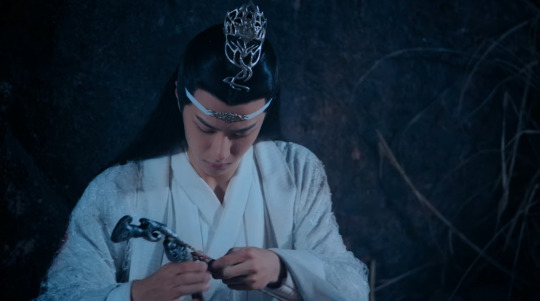
Arts and crafts project with bae! Sorry, I couldn’t help myself. I kind of love this scene, though, for what it is: the two of them quietly working together, each with his own task. There’s something kind of domestic about it, even in this dire situation. Also Lan Wangji is doing most of the work. It’s fucking hard to string/unstring a bow.
And when they’re picking up all the bows and arrows, I’m always thinking that the others made such a mess! They just chucked the arrows everywhere, dropped their bows. But why are there so many arrows on the ground? You’d think they’d mostly be in the water, as that’s where the Tortoise of Slaughter was. You know? I’m not gonna think to hard about this.
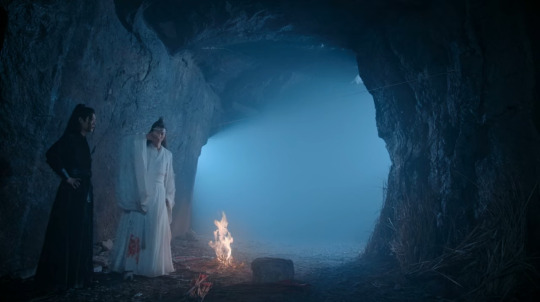
Imagine that instead of the bowstring, it’s actually one of those sticky hand things that you can swing around and stick to walls.
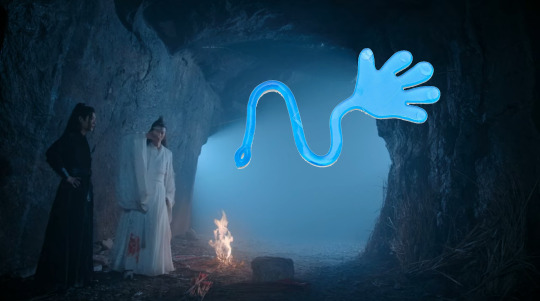
I spent too much time on that, I’m sorry.

Again, Lan Wangji is reminded that he’s injured and can’t be a ton of help in this situation. And I think he’s bothered by this quite a bit—not because he wants to play hero and save Wei Wuxian, but I think because he doesn’t want Wei Wuxian to bear too great a burden alone. And I think Wei Wuxian is coming from a place of caring and kindness when he points all that out. It’s not as if he wants glory either: he realizes that he is their best chance of survival, and he also knows he can count on Lan Wangji to be there for him.
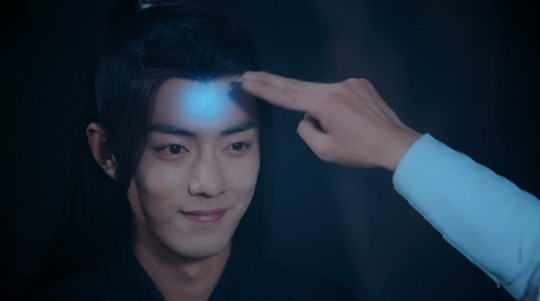
This smile is so warm, so kind, so loving. Yeah, it is loving. And I do think that this sort of relationship is a big deal in the context of this story. You have two people from different clans, who have vastly different upbringings (although there are similarities with their parents’ deaths), able to come together and genuinely feel friendship for one another. This kind of thing is not that common, seemingly, in this world. It happens, right? It happens for political reasons (sworn brothers, etc.), it happens when there are marriages between clans—but we know that it isn’t common to have this particular kind of friendship, because the script literally pointed it out to us: Xiao Xingchen and Song Lan. They are different—they are close, they are soulmates, even (in a platonic way). And Wei Wuxian and Lan Wangji are held up to them as a direct comparison (“Lan Zhan and I went on a night hunt together”). And wangxian isn’t a friendship of convenience—they weren’t forced here together and then they have to tough it out—this was all chosen. And I think this is where the whole “soulmate” conversation becomes important, in that them coming together and forming that bond in the Cloud Recesses was driven by some kind of fate. That initial meeting, those subsequent experiences they had—if those things hadn’t happened, they probably wouldn’t be in this cave together right now. That being said, the fact that they are in this cave together right now is definitely not fate. This was a choice—or a series of choices—made by the two of them. Had there been no friendship or love between these two, Lan Wangji would have left the cave with the others. Maybe Jiang Cheng would have stayed behind, or maybe someone else would have, or possibly no one! I like to think Lan Wangji would have stayed regardless of any feelings he has towards Wei Wuxian, simply because he’s that kind of person. He stands up for Mianmian because it’s the right thing to do, for example. But as things are, it’s important that Lan Wangji stayed because of Wei Wuxian—because of his feelings for him, because of their friendship, because they have this connection to each other. And I think it’s vital that Lan Wangji is the one to first see what the Yin Iron can do to a person, specifically the person he loves.
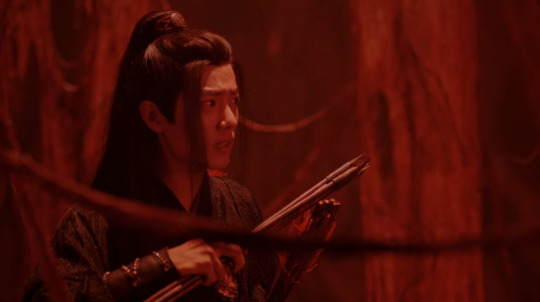
So I thought this whole little section here was just Wei Wuxian monologuing in his head the first time I watched this. And then he’s suddenly having a conversation with Lan Wangji, and I was like, “huh?” I am pretty sure I had to rewind and rewatch just so I could understand it with the newly-acquired knowledge that Wei Wuxian was actually talking to Lan Wangji. I’m find being a little confused, but would it have killed them to make Lan Wangji say, “Now we can communicate while you’re inside” or something to that extent, after using his little powers?
Anyhow, fuck, it’s horrible in there! I feel like the smell is visceral, even though I’m watching it on my laptop, it’s like I can feel the damp, air, thick with the smell of death and decay. Credit to Xiao Zhan for just really selling me on what it feels like to be in there. Also I’m so curious what they’ve got him walking through. I wish there were some BTS on that scene. I can imagine (because this is how my mind works) how difficult it was to clean his costume after that. Like that crap must have gotten into every tiny little nook and cranny of his shoes, and just YUCK! They were like, “Just throw them out. We have another pair.”
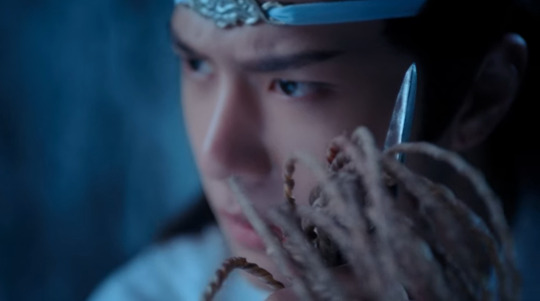
Since Wei Wuxian and Lan Wangji are in a sense psychically linked here, does that mean that Lan Wangji can feel the energy that Wei Wuxian feels from the sword? He’s definitely reacting to something going on, but then I think Wei Wuxian talks about it later as if Lan Wangji doesn’t know. The romantic in me says that Lan Wangji is reacting because they are so spiritually connected that he can feel when something is wrong.
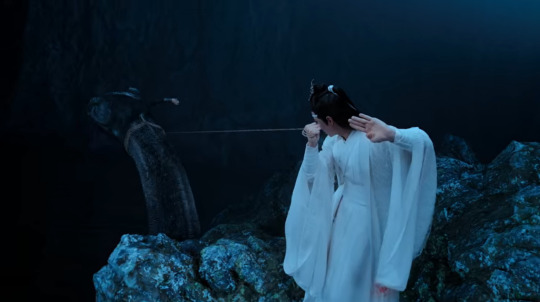
And now we have this very long action sequence where Lan Wangji does a lot of flying around and Wei Wuxian clings to that sword like Harry Potter on that bucking broomstick in the first movie. I’m sorry, that’s all I think about, and that thought will never leave my mind. What’s kind of cool is that they remind us immediately that Lan Wangji is still injured, by showing us his bloody leg right at the start of this sequence. So he’s flying around, using everything he’s got left, while still being gravely injured—it shows you just how powerful Lan Wangji is. He’s no weakling.
Another cool detail is that you can actually see the staining on Wei Wuxian’s boots from the muck he was walking around in! Nice continuity!

I can’t help it, anytime Lan Wangji yells out, “Wei Ying!” I melt into a puddle on the floor. There’s something about how little he does talk that when he does, it’s important and meaningful and impactful. And, yes, most of his lines are yelling out Wei Ying’s name, but that doesn’t make it any less meaningful when he does it. Every time he says it, it’s a reminder that there is a strong relationship there. As I’ve said before, even Jiang Cheng doesn’t call him by his given name. This is not just an everyday friendship here—it’s more than that—it’s a bond that can’t be broken even in death. That might sound silly and dramatic, but it doesn’t make it any less true. And that’s why when I hear him say, “Wei Ying!” it draws to the surface all of these other feelings. It’s not just a name, it’s not just a line—it’s something so much more.
Also, I want to point out that as soon as Lan Wangji figures out something is indeed very wrong with Wei Wuxian, he goes into overdrive. His hands are bleeding from the bowstring in his hand, his teeth are gritted, he somehow reaches into himself for even more power to defeat this monster.
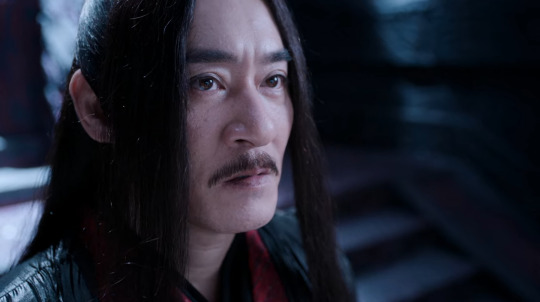
Seriously? How dare you interrupt my wangxian scene with this garbage? I could not care less about anything going on in this scene. Just fuck off. The worst cut ever. What a stupid cut.

So, as if the Tortoise of Slaughter wasn’t bad enough, this poor kid (because he is just a kid) is now traumatized by the voices coming out of that sword. The pain, the fear, the negative energy—all of it was coursing through him, and worst of all, perhaps, he was even able to use that energy to defeat the monster. And I think, now that he’s felt it and seen it and used it, there’s really no going back. Dangerous? Yes, it’s dangerous, but it’s also powerful, and it saved their lives.
This part kills me every time, though, no matter how many times I see it. Wei Wuxian is just a husk of the person he was ten minutes ago. Where’s that cocky, smirking smartass? Where’s the Wei Wuxian we all know and love? But the reality is, part of him is lost. And throughout the scene, he’s clutching that sword, as if his life still depended on it. He won’t let that thing go, and I also find that hard to watch. And Lan Wangji here is out of his mind, desperate to help him. He runs into the water so fast, as if there is no leg injury at all. And, of course, that’s adrenaline for you, but it’s also just a testament to his strength and resolve and his willingness to go into a literal hell for Wei Wuxian.
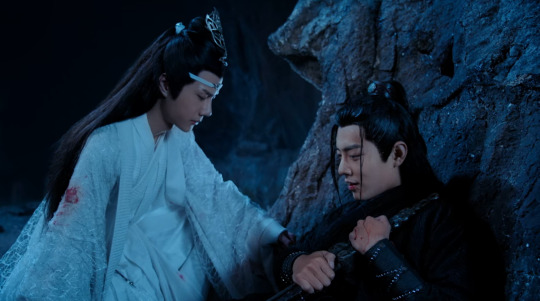
And even in his feverish state, Wei Wuxian can’t help but tease Lan Wangji a little, pointing out that he never expected Second Master Lan to be this concerned about him. But it’s interesting that he uses that formal title there, as if he’s putting distance between them. Wei Wuxian is just Wei Wuxian—Wei Ying—and Lan Wangji is Second Master Lan. Whether it’s intentional or not, he’s drawing attention to this hierarchical difference between them, and I don’t think it’s a self-worth issue at all, because I think Wei Wuxian is okay with who his is—I don’t think he has qualms about that really. It’s more driving home the point of we shouldn’t be this close. Or isn’t it funny that we are this close? And he later draws a parallel to Jiang Cheng (again) by saying that at least Jiang Cheng wouldn’t be a boring companion (EDIT: Okay, he doesn’t say that—maybe in the book?). Ironic, because their stay in Xuanwu cave has been anything but boring. But I also think Jiang Cheng would not have been able to maintain his cool at all in that cave. No, I think that Wei Wuxian needed Lan Wangji to survive. He needed someone a little cold, logical, quick-witted, but desperate.
OMG, ALSO! Can I point out the lovely, beautiful, haunting cello music that’s playing this whole time? Not on the OST, which is a damn shame. So you’ll have to watch the episode to hear it, but it’s just so beautiful.
And pause for the clip show that will also make you cry!

“Wangxian.” Yes, yes, the greatest mystery of this whole series—the name of the song and how Lan Wangji immediately recognized Wei Wuxian in the second episode. So I don’t think they ever actually tell you the name of the song, right? It’s like this fun little thing for the fans of the book, and maybe they couldn’t say it because of censorship (because of what it implies, you know?). I’m not a great lip reader, but it looks like “Wangxian” to me. And if he’s saying something else, I don’t care—it is going to be Wangxian to me, regardless.
Man, this scene, though. I can never really hear the humming because you have to turn up the volume so damn loud, and even then it’s hard to hear. Maybe it’s just me. The first time I watched it, I was like, is he actually humming? I don’t hear anything. I was, again, confused. But anyway, it’s good that we see all those scenes with Lan Wangji, because guess what? You’re not going to see him for three or four episodes, FML. FML. FML.
FML.
Can you tell I’m not excited about these upcoming parts? Honestly it’s so tempting to skip it, but that’s not the point of this rewatch. I likely won’t have a ton to say, though, so maybe I’ll do more than one a week (don’t count on it, though).
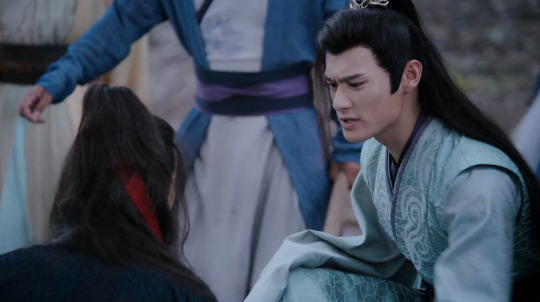
Okay, guys. Here we go. If you think Jiang Cheng is a kind, gentle soul with a rough exterior, then you may not want to read the next few episodes. I like Jiang Cheng. I do. However, he is an asshole. A complete and total asshole with the occasional kind word thrown someone’s way. I think he cares about Wei Wuxian, as I’ve said before, but that he cares about himself far more. He is the antithesis to Lan Wangji. And that’s definitely on purpose. So, feel free to send me asks or whatever (and that goes for anyone, by the way—I don’t bite and I like to chat with people), but you’re not going to be able to convince me even that CQL Jiang Cheng is a good guy. I think you could try and read him that way, but you’d be ignoring some key things in his behavior and his character.
All right. Now that that’s out of the way, let’s start anew. It fucking sucks that the first people Wei Wuxian sees upon waking up are Jin Zixuan and Jiang Cheng, both of which essentially scold him immediately, as if he didn’t fucking save their lives back there. I’m sorry, that guy right there—yeah, him—he was read to sacrifice himself to save you. Jin Zixuan, “I didn’t do it for you.” Then why? You did it for Lan Wangji? Or you did it because it would be politically advantageous to you because you were engaged to Jiang Yanli? I’m just saying, be nicer to the man who was willing to die for you, okay?
Oh, my god, as if that weren’t enough, Jiang Cheng actually gets angry that Wei Wuxian doesn’t thank him! And this isn’t some macho guy thing where he just can’t show that he cares about him—this is just who Jiang Cheng is. He thinks of himself first and others second. Period.
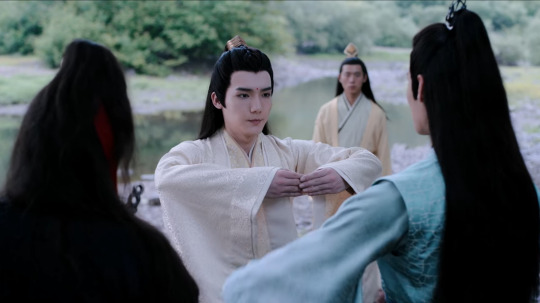
So aside from those two being assholes, we do at least get some information here. The clans are now all resolved to fight against the Wen Clan. They all know what’s going on and they’re finally ready to stand up against it. The Cloud Recesses is trashed and Lan Wangji left on his own to go back, presumably to take it back from the Wens. I would have loved a heartfelt scene of them getting out together, but that isn’t even in the book, so CQL isn’t going to add that kind of nice stuff, I guess. But they did add this scene, which is mostly just showcasing that Jin Zixuan and Wei Wuxian still don’t like each other, Jiang Cheng is an asshole, and the world is generally fucked up right now.
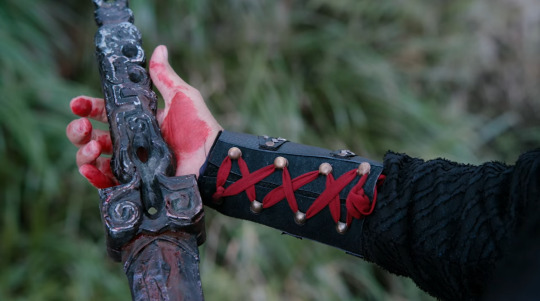
A reminder that even though he’s in the bright sunlight, Wei Wuxian still has this darkness. It’s permeated him now. He can’t turn away from it. It’s part of him. And it’s something he can’t really share with anyone else—Lan Wangji to a point, but even he doesn’t get to know everything. However, he is, I think, the only one who would have listened.
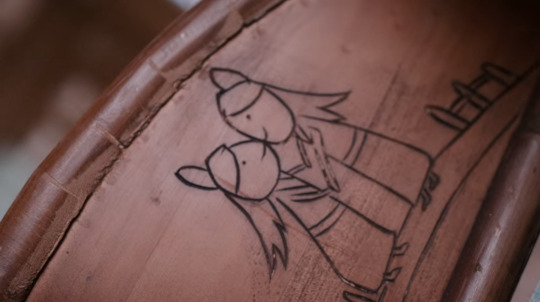
Cute detail from the book, that Wei Wuxian had carved this into his headboard. What a romantic lol. I don’t have anything special to say other than, y’know, those two could be both guys.
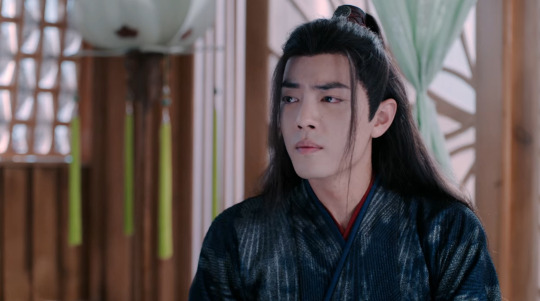
It’s hard to even know what to say here. So much is going on, so many emotions, so many accusations—and Wei Wuxian is caught up in all of this. Madam Yu starts by chastising him for making trouble when he didn’t need to (she thought it better to let the Jins and Lans handle things, no need for the Jiangs to get involved), and then it spirals into this horrible tirade about Jiang Fengmian being hung up on Wei Wuxian’s mother, and in turn favoring Wei Wuxian over his own son because of it. There is so much jealousy and hatred and guilt wrapped up in all of this, it’s hard to even comment. I can’t imagine growing up the way Jiang Cheng did, feeling second best in everything by someone who’s not even your actual brother, feeling like your own father doesn’t really love you as much as he loves someone else. And now throw in that your father doesn’t love your mother because he had an affair with another woman. I can’t imagine how awful that would be. And despite what people might say, it’s hard to really, truly, break away from your parents, especially in a culture like this. It’s important to honor your parents in everything, so standing up to them is a definite no-no. And Jiang Cheng probably feels like the only parent who really loves him is his mother, even though she is the worst person ever. This doesn’t excuse his behavior, but it does help explain a bit of why he does the things he does to Wei Wuxian. I think he’s itching to feel superior over him, and that he’s been extremely jealous of him for a long, long time.
And then, god, what Wei Wuxian is feeling here! He’s the first one to always take the hit for Jiang Cheng. He’s always going to do whatever he can to make him feel better. He makes the sacrifices. That’s part of who Wei Wuxian is—he’s very selfless and courageous. I also can’t imagine how he feels, to be stuck in the middle of this very personal, very private family argument. The kind of raw emotion that’s on display in this scene is hard for me to watch. It’s awkward, it’s ugly, it’s a dark side to family dynamics that a lot of us thankfully never have to experience. It’s horrible to think that even when Wei Wuxian and Lan Wangji were basically awaiting death in that cave, it was quite peaceful, though the landscape was harsh. And now that he’s back in this peaceful setting of Lotus Pier, he’s faced with another monster in the form of his adoptive family.
Of course Wei Wuxian knows that Jiang Fengmian doesn’t love him more—he’s harsher with Jiang Cheng because he’s the heir and he needs to be tougher, he needs to be able to lead this clan. I’m curious if Jiang Fengmian actually did have an affair, but if anything, it was probably emotional. I don’t think that Wei Wuxian is his love child or anything. But at the end of the day, the way I read this is just that the man has trouble being there for his son on an emotional level, and he feels bad for Wei Wuxian and overcompensates for that by giving him more attention. The thing is, while I don’t agree with it, I think he’s harder on his son because Jiang Cheng needs to someday lead. All Wei Wuxian needs to do is support that. And he does. He always supports Jiang Cheng. Always, that is, until Wei Wuxian finally starts to think about what he wants to do with his life, and he doesn’t want to spend it torturing people who don’t deserve it.

The Twin Prides of Yunmeng. It’s a nice idea, but it relies on Wei Wuxian submitting himself to Jiang Cheng at all times for the rest of their lives. It makes Wei Wuxian give up his agency. It makes him give up his dream to do what’s right and always have a clear conscience. If he had followed Jiang Cheng into fire, he would have had to lose himself in the process. So this is a promise that Wei Wuxian could never hope to keep. Although it’s a nice promise, it was said to make Jiang Cheng feel better.
Other episodes: 1 | 2 | 3 | 4 | 5 | 6 | 7 | 8 | 9 | 10 | 11 | 12 | 13 |
#wangxian#wei wuxian#lan wangji#cql#the untamed#jiang cheng#jin zixuan#jiang fengmian#madam yu#wwx#lwj#mdzs#mo dao zu shi#cql rewatch
17 notes
·
View notes
Text
Realm of the Quarantine Reread End-of-Book Questionnaire: Royal Assassin
Any differences between your first/previous reading experience and this one?
Not as stark a difference as with Assassin’s Apprentice, but definitely still there. Apart from all the obvious stuff, like feeling much more attached to the characters already and picking up more details, I think the biggest change was a complete lack of patience for the teen romance drama lol. There was a decent period where I was feeling quite frustrated with it. Not that I loved it the first time round, but back then I had a very different view of how it fit into the story. I saw it as teaching Fitz a depressing lesson of what it really means to be a royal bastard and a king’s man. Fitz’s literal need (for all he knows he would have been killed if not for his deal with Shrewd) and sense of duty to put his loyalty to his king and country first creates a relationship that is toxic, turbulent and built on lies. And teenage horniness masquerading as love. I saw all that the first time and thought it was just something he had to go through. Now I know it’s something he never really goes through but rather grips onto, romanticises and ultimately goes back to. I know the point of that is meant to be that he finally gets to have something for himself, but why it had to be Molly specifically??? I have very few qualms with Robin’s writing choices overall, but why she chose to write their relationship this way if they really are meant to be is beyond me, especially when so many of her other romances are written so well - it feels like it can’t possibly be unintentional. For most of this book they’re either fighting or fucking and honey! That ain’t love! Hell, Fitz all but sees her as just another demand on his time as the book goes on. But he can’t let her go because she’s the one thing he can point to that makes him feel normal. Not happy, not cherished, not safe. Normal. She’s simply a refuge from his real life. He literally says to Chade “I need her.” I find that so telling, man. It’s not really about her, which is a shame because Molly is great. They’re just really not good for each other.
So yeah. It’s just kind of trying to read all the Fitz/Molly stuff when you know and don’t like what it ultimately culminates in. At the same time… Bee… So I will always be conflicted lol. I just can’t separate the events of Royal Assassin from the furious disappointment I felt when I finished Fool’s Fate. Perhaps I’ll have a new Fool’s Fate experience this time that will make the next re-read a bit easier in regards to Fitz and Molly? But I won’t bet on it lol.
Anyway. It’s not as if I haven’t already said just about everything there possibly is to say about Fitz and Molly yet I also feel like I could go on about it forever. Luckily this is kind of as bad as it gets in terms of how much “screen time” they actually get (apart from Fool’s Assassin maybe? But they don’t bother me too much in that) so yay! I made it! And hopefully it’ll be a good few books before y’all have to endure my ranting about it again :)) Also hopefully this doesn’t give the impression that this read was more bad than good? It was mostly just a particular angsty chunk before they properly get together that was a bit of a slog to get through, but overall I really loved reading this book again and got a lot out of it.
Something you can’t believe you forgot
That Molly punches Fitz in the face hard enough that he bleeds and that Fitz fully intended to punch the Fool for asking if Molly was preggo before seeing he had already been beaten. I pretend I do not see it.
Favourite character introduction moments/scenes
Omfg I was just about to say “huh we didn’t really get any major character intros in this book” bitch Nighteyes???? But in my defence I just. Cannot process the fact that Nighteyes is only really in 3 of 16 books he just feels omnipresent to me BUT his introduction is most definitely iconique and god I love him and he made me cry eight thousand times!
Favourite character arcs
Speaking of Nighteyes: what a glow up. He goes from angry, scared, untrusting little bb to……. Nighteyes. Like. How does one even describe the kind of person Nighteyes becomes. He’s just Nighteyes and I love him with all my fuckin heart!! He is Fitz’s constant… He is wise… He is silly… a comedic genius…… a big, open, unconditional heart. Incomparable. I can’t believe I’ve seen ppl saying they dislike/d Nighteyes……. Honey…… it’s called taste xx
Favourite quote/s
Again no tabs so it’s a bit harder to keep track but there were a few that stuck out enough to copy down. There are a lot of iconic quotes in this book that get shared a lot so I only bothered with ones I didn’t remember.
- “I wince to think of the price willingly paid for loving me.”
- “My soft, clean bed beckoned, like a soft, clean tomorrow.” (mood)
- “I looked and saw they were both made of hungers, like containers made of emptiness.”
Favourite relationships
Kettricken/Verity obviously. I was shocked by how little time they actually have together being in love before Verity leaves??? Because all I remembered was how strong their love is. But the whole journey towards that love is what makes it stand out as an actual compelling story in its own right. This is definitely one of Robin’s greatest skills as a writer; giving the minor characters depth by giving them their own relationships that grow and change and have a life of their own outside of Fitz. It makes the world feel so much more alive.
Also Burrich/Fitz in this book continues to be bittersweet, but with a lot more sweet in there than usual! They fully start out this book as a team. Burrich calling Fitz “FitzChivalry” makes me fuckin emo and idk why even. Burrich does seem to start seeing Fitz a lot more as his own person in this book which changes their dynamic in some rly nice ways. The fact that towards the end of the book Burrich even uses the wit to help Fitz is enough to make me cry tbh - and writing this has made me realise that I’m officially past any uncomplicated good times between Burrich and Fitz y’all mind if I fuckin die real quick!!
Fitz/Verity is soy pure and beautiful. Fitz and the Fool is always, always compelling and complex and tender and perfectly mysterious. But overall you’d have to say Fitz/Nighteyes, hey? They are literally meant to be, in a way so straightforward and undeniable and beautifully simple that I never really know what to say about it. Little brother!!! :’) They literally make me cry all the frickin time lol rip!
Favourite setting
There aren’t that many to choose from in this book! Ima go with the skill river bc hey, Robin’s magic systems are so unique and beautiful and the fact that the skill is written as a kind of a place is really frickin cool and deserves a shoutout.
Favourite chapter
The final chapter (not the epilogue) ummm broke my heart but it is written so beautifully, oh my god, it’s like an out of body experience. I feel like this is kind of when RotE becomes RotE - the first time it really goes to that place that is so fitting yet so unexpected, so beautiful, so tragic, so awful, so visceral. Making use of the genre to really test the limits of humanity; to see how far you can bend a person without breaking them and then refusing to turn away from the consequences. Idk man!! I don’t know how to describe it without sounding like a pretentious dick but it really is that intense and strange and overwhelming for me. There is something in that moment, when Burrich pulls Fitz’s body out of the earth and Fitz/Nighteyes is recoiling from it and deeply terrified… Something about the enormity of the existential questions raised converging with the pinpoint specificity of it all being wrapped up in the story of a character that feels so real and who you care about so deeply… It’s almost written like a horror scene, but that’s not quite the feeling. It’s just the RotE feeling; there are multiple throughout all five series, and it’s what makes these books unlike any other.
Most loved character
Fitz, Nighteyes, the Fool all had my entire heart this book. The Fool is just so sad and pathetic and literally must be protected!! I think I’m kind of obsessed with Burrich? Also I think I almost forgot how much I love Kettricken? She’s a complete badass of course but she’s also got the biggest goddamn heart like…. Who said she was allowed to be such a beautiful person???
But god, everyone. I love them all.
Most hated character
What can I say? Regal is disgostang. Wall Ass a close second.
Raise your hand if you’ve been personally victimised by Robin Hobb (most heartbreaking and/or visceral moments)
Shall I list just a few? :)
- Burrich screaming at Fitz through the bars of his jail cell, horrible things you can’t help but feel are at least a little bit true
- Burrich sobbing over Fitz’s dead body repeating, “You aren’t dead, you aren’t dead.”
- Fitz going to Nighteyes before everything went down on the night of the coronation and just fuckin hugging him really tight
- Fitz trying desperately to leave his broken vessel behind but not quite being able to disown his body
- The Fool being beaten
- The Fool being beaten again
- The Fool sprawled and weeping across Shrewd’s dead body
- The Fool really believing for a moment that Fitz had betrayed him and killed Shrewd
- Fitz tending the Fool’s wounds………. bitch….
- Chade giving Fitz a chance to escape with them and Fitz going to kill Serene and Justin instead
- Idk why this is even that sad but Nighteyes saying the only person he loves is Fitz!
- The entire incident with the forged ones literally tearing apart a three year old girl, which I had completely blocked out until now :)
- The fact that Fitz continues to be reminded and traumatised by this incident for the remainder of the book beCAUSE HE IS A GOOD BOY. A VERY GOOD BOY WITH A VERY GOOD HEART.
- Fitz repelling at Nighteyes to try and force their bond broken
- LITTLE BROTHER
- WOLVES HAVE NO KINGS
- High off his face Fitz calling Patience “mother” no shut the fuck up!!!!
Details, observations, spoilery notes made with the benefit of the full picture
- I’ve been trying for ages to decipher when the Fool started falling for Fitz, and I think I’m officially putting my money on their last interaction in AA. “I wish I had a place that was as much me as that place is you.” I mean. If someone said that to me… I’m not a slut but who knows, ya know? (I know this is more a note for the last book but I thought of it while reading this book. So shh.)
- It’s so clear to see this time how much Fitz’s sense of self and politics are affected by his time in the Mountains. He obviously feels much more inclined to their way of thinking about royalty and sacrifice and equality and returns to Buckkeep with a self-respect he’s never really had before. Weird how being among people who don’t just think of you as The Bastard will do that.
- It’s no wonder Fitz becomes so fixated on Molly; he literally has almost nothing else to occupy him and no companionship when she suddenly shows up
- It’s gross that he spies on her, obviously, but you can’t not take into account the fact that Chade has been teaching him since he was ten that this is justifiable behaviour; a reasonable way to gather information and get what you want. Fitz’s lack of social awareness goes further than him just being a little awkward; he has literally been trained to believe the only thing wrong with stalking would be getting caught.
- I’ve seen a few people talk about the fact that Regal isn’t appropriately punished as if it’s bad writing and like, while it is frustrating, it is supposed to be frustrating - it is not a plot hole. It made sense to me the first time I read it and it was even more obvious this time; Regal has the loyalty of the inland duchies. If he were to be publicly punished those dukes would rally behind him and raise hell, and Regal would no longer need to play the part of the dutiful prince. Even if Regal died a “natural” death - something I can’t see Shrewd or Verity orchestrating anyway - the inland dukes would feel that they no longer have a Farseer on their side and may, again, raise hell. It’s a delicate balance that would be outrageously difficult not to topple if you removed Regal from the equation. There is a lot more to it than I’ll bother writing here but yeah. I don’t really know how people can read this book and think that Regal retaining his life and position is some sort of lazy plot contrivance. It was all set up in the first book dude.
- Fitz and Nighteyes meeting in this book is the perfect metaphor for our need for connection versus the fear of inevitable loss. Fitz’s experience tells him that entering into a bond with an animal can only end in pain, yet he can’t resist it. In real life this is especially true with humans and our animal companions, since they almost always have a shorter lifespan than us; signing up to love them is signing up to lose them. But the same is also true of our relationships with other humans. And like Fitz, we have all had our fair share of loss and pain. We all have our reasons to be afraid of the connection we naturally crave. Sometimes we give in to the fear to the point of holding ourselves back from it entirely. That’s where Fitz is at when he meets Nighteyes. But what’s so beautiful about their arc as a metaphor is that it suggests that these connections, if we submit to them, are what keep our vital spark alive. Even when Nighteyes dies later in the series, the sentiment always remains, essentially, “It’s better to have loved and lost than to have never loved at all.” Ya boi is projecting bc it’s hard to be vulnerable and make friends as an adult, but I think the observation stands. Love and connection and vulnerability are key threads that run throughout all of Fitz’s story, but in this book it is best represented through him and Nighteyes.
- “I hoped I would not become too adept at lying to myself.” Honey, you got a big storm comin.
- Very inch resting (gay) that Fitz finds it hard to meet the Fool’s eyes. I know almost everyone does bc his eyes are weird, but I reserve the right to reach and I will absolutely NOT be accepting criticism.
- I find it interesting that Fitz says Kettricken’s wit is not strong just because she doesn’t use it exactly the way he does
- I know it’s not meant to be funny but……. The way Fitz described losing his virginity had me literally laughing out loud
- Fitz was really like “okay i better go break my bond with Nighteyes” just cos he and Molly fucked. Teenagers don’t deserve rights.
- You know what? I really, really appreciate how fucking weird these books are lol. What other author would use their magic system to have their characters accidentally intruding on each other’s awkward sex stuff? Okay, maybe a few, but they would do it to be like, edgy and sexy. Robin Hobb just does it to make you cringe so hard you lose several years off of your life.
- But seriously, even apart from the cringe stuff, these books get so strange and out there and like! That’s what magic is for!
- Bruh. When Fitz is like “omg poor Verity…. He’ll never have what i have with Molly” I don’t think I’ve ever heard someone encapsulate the self-important delusion of teen romance so perfectly lol. Wow.
- Okay some Fitz/Fool stuff that made me lose my tiny mind. Sorry.
- Fitz literally said about the Fool “he burned too brightly” I WILL DIE.
- Fitz is always like, irritated by the Fool… yet positively delighted by his presence at the same time…… okay bitch
- Inch resting how Fitz has always been uncomfortable with the Fool getting serious. I don’t quite know how to put my thoughts on this into words so like. I’ll just put it there. Make of it what you will.
- “Sit on my clothes chest and take your shirt off…” i stopped fucking breathing noah fence
- “I ran my fingers lightly down the line of his jaw, and around his eye socket. At least no bone seemed damaged. ‘Who did this to you?’ I asked him.” my GOD this is literally textbook gay/romance. It hurts me. It physically hurts me.
- Straight from my notes: “I can’t even focus on reading this bc it’s the first time they are tending each other’s wounds and I am a homosexual!” and “the gays are quaking!! (it’s me I’m the gays)
- Okay wow! I think that’s it! Hello if you made it this far! Hope this was remotely coherent and I’m always keen to hear your thoughts on my thoughts :)
Anyone doing a reread feel free to fill this out! You don’t have to use the tag :)
#rote#realm of the elderlings#royal assassin#royal assassin spoilers#fitzchivalry farseer#realm of the quarantine
37 notes
·
View notes
Text
SCUM IN THE AISLES #4 (The House That Jack Built: Unrated Director’s Cut)
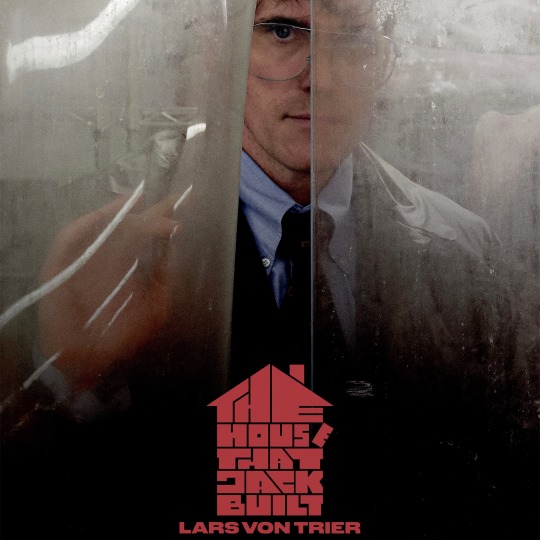
Sometimes, in order to seek out the weirdest discarded slices of celluloid trash that cinema has to offer, one must leave the confines of their crappy apartment, and go to an actual movie theater. This is a column recounting my excursions into the b-movie wilds. This is Scum in the Aisles!
PART 1: ANTICIPATION
“You’ve all bought tickets for a Lars von Trier film, so you know what you’re getting yourselves into.”
With this, Justin Timms, the founder of the Brooklyn Horror Film Festival, and our host for this evening in a dark and chilly corner of Greenpoint known as the Film Noir Cinema, ceded the floor to the film we had all gathered to experience, The House That Jack Built. A two and a half hour art house serial killer epic by perhaps the most controversial filmmaker alive. A film that prompted both mass walkouts (anywhere between a dozen and a hundred people, depending on who you ask) and a ten minute standing ovation when it premiered out of competition at this year’s Cannes Film Festival. A film which has since been decried as a gruesome, sadistic, mean-spirited slog by some, and praised as a beautiful, self-reflexive act of provocation by others.
Timms, for his part, had just seen the film for the first time along with the crowd from the first screening of the evening, and he looked positively shell-shocked. All around me, the crowd buzzed with nervousness and excitement. What sort of celluloid horrors awaited us? Would we be able to stomach what was splayed up on the screen? Would cinema’s angry Danish trickster god once again succeed in getting under our skin and raising our cockles? Or had his flagellations, both towards himself and the audience that improbably keeps coming back (myself included), grown tired and stale?
Our host had claimed that we knew what we were getting ourselves into simply by showing up to watch a Lars von Trier film…but did we?
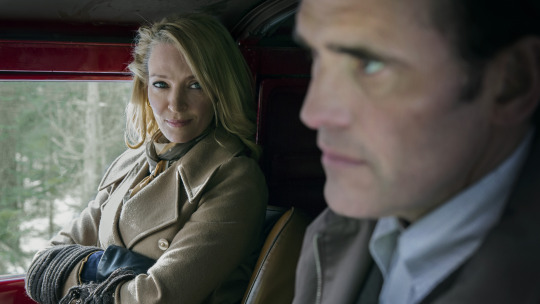
PART 2: SYNOPSIS
The House That Jack Built follows Jack (Matt Dillon, turning in a career best performance) over roughly twelve years of a very eventful life. Jack lives somewhere in the Pacific Northwest, he’s an engineer who dabbles in architecture on the side. He comes from a wealthy family; his inheritance allows him to buy a large plot of land by a picturesque lake and build his titular house. However, what Jack really loves, his true passion in life, is annihilating other human beings. Jack is not just A serial killer, he is THE serial killer. Dude makes Jeffrey Dahmer and Ted Bundy, both of whose real life exploits are alluded to via Jack’s activities in the film, look like slouches.
As von Trier likes to do, the film is divided into five chapters and an epilogue. The five chapters are each devoted to a specific murder out of the nearly hundred he commits that is supposed to make us understand why Jack does what he does. I’ll get to the epilogue later, because I have FEELINGS about it. Similarly, as von Trier also likes to do, Jack narrates these chapters in the form of a confession, in this case to a man named Verge (Bruno Ganz). With the first two chapters, von Trier catches us off guard by deploying humor. Aside from the violence, which is indeed quite brutal, von Trier manages to wring genuine laughs out of the absurdity of these situations. In the first chapter, Uma Thurman plays a rich woman with a flat tire who is so unpleasant and annoying that you can’t help but root for Jack to kill her. In the second chapter, Siobhan Fallon Hogan makes the mistake of believing Jack when he knocks on her door, first pretending to be a policeman, then incredulously switching gears and pretending to be an insurance salesman, before a comedy of errors involving Jack’s cleanliness-based OCD, a very annoyed local cop, and a telltale trail of blood ensues. The audience I saw it with tonight ate these moments up, partially laughing at the jokes themselves, then perhaps doubling down when we realized how inappropriate it was to be laughing in the first place.
However, the laughs quickly dried up once chapter three began. This chapter involved the shooting of children, and was the focus of much of the ire directed at the film after Cannes. Indeed, especially in a post-Sandy Hook world, the violence in this section was almost unbearable. Aside from seeing children gunned down in graphic detail, Jack then conducts some, shall we say, amateur taxidermy with one of the corpses, making for the second time in two films that von Trier has given us the nightmare image of a child with a horrifying rictus smile (shoutouts to the baby from Nymphomaniac Vol. II). Chapter four details the gruesome fate of Jack’s one and only girlfriend, played by Riley Keough. Von Trier ratchets up the tension here to near intolerable levels, foreshadowing a horrific act of mutilation a good ten minutes before it happens, and then showing it up close, in nauseatingly graphic detail. Most of the audience, myself included, watched this scene through our fingers.
Now, very quickly, I’ll say that, yes, for most normal moviegoers, the violence in this film will definitely be a lot. But speaking as a connoisseur of horror movies and weirdo genre experiments, it wasn’t anything outside of the ordinary. In fact, I found the violence in Antichrist to be way more upsetting and visceral than most of what you see in this film.
Chapter five sees Jack conducting a gristly experiment in his industrial freezer involving full metal jacket bullets. He also picks up a spiffy red hooded robe. This is where we catch up with the beginning of the film, and see Verge for the first time. As it turns out, Verge is here to chaperone Jack to the fires of Hell. This is where the Epilogue kicked off, and where the audience, myself DEFINITELY included, started to get a bit antsy. I seem to recall an old maxim that goes something like, you can do anything to an audience aside from bore them. Well, unfortunately, I found this Epilogue to be almost unbearably boring. Aside from some stunning imagery, it was mostly tedious and pretentious, straining for some sort of higher message that was just unnecessary. If I had to sum it up in one sentence, it would be: Tarkovsky by way of Tim and Eric. Normally that would be a compliment coming from me. All the pretty pictures in the world means nothing if the audience is reaching for their coats.
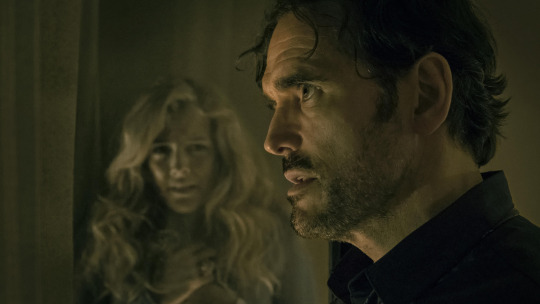
PART 3: INTENTIONS
So what is von Trier trying to tell us with all of this madness? What does he want us to take with us once we leave the theater? If you follow his filmography, it’s not a big scoop to say that von Trier’s most recent work, starting with Antichrist and continuing through Melancholia and the Nymphomaniac films, have been somewhat autobiographical, sort of his version of State of the Union addresses. The House That Jack Built feels like the culmination of this stage of his career. In this film, von Trier puts himself on trial, with Dillon’s Jack as his surrogate. Just like with the Nymphomaniac films, there are many, many, MANY flowery, pseudo-philosophical digressions on a number of topics, accompanied by slides and bits of archival video (I’ll bet someone out there is kicking themselves for ever having introduced von Trier to Shudderstock), including the poetry of William Blake, photography, love, deer hunting, gothic architecture, and Glenn Gould. One especially epic digression finds Jack opining on dessert wines, the Third Reich architect Albert Speer, and finally the artistic integrity of von Trier’s own cinematic oeuvre, complete with clips from his previous films. Ballsy, no?
I would be lying to you if I said I understood everything that von Trier was trying to convey with these digressions. However, it is definitely clear to me that this film is meant to function as sort of a statement to the jury in the court of public opinion. Von Trier has always put himself at the forefront of his films more so than most directors, displaying his name alongside, or sometimes above his actors (hell, for this film, he even devoted an entire poster to himself). This, of course, means we the audience tend to read his films as glimpses into its maker’s psyche more than we would for most other directors, which is not entirely fair in my opinion, but it’s a blessing and a curse that von Trier has brought on himself. So what does he want us to understand about himself after we’ve seen The House That Jack Built? It seems to be something along the lines of, yes, every awful thing you’ve said about me is true, and you could never hate me as much as I hate myself, but I only answer to a higher power. Which, yeah, ok...but is that enough? Or, to put it more succinctly, is that even that interesting of a conclusion? We’ve now sat through nearly ten hours of von Trier’s cinematic therapy sessions over the last decade, and he basically ends it all by pulling a Tupac on us: only God can judge me.
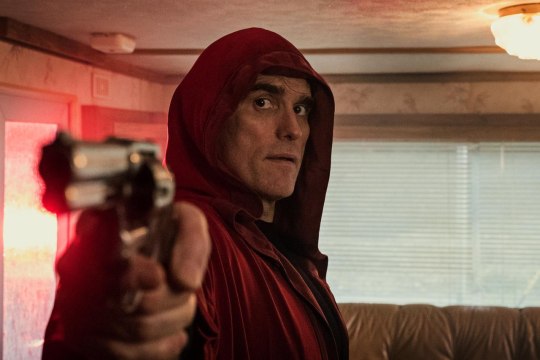
PART 4: MISANTHROPY
The best and most succinct description of von Trier’s modus operandi as an artist that I’ve yet to hear comes from the excellent YouTube movie review show Welcome to the Basement. During their most recent episode, while giving a (largely negative) critique of Dogville, co-host Matt Sloan describes von Trier as “a provocateur that has the talent to back it up.” Indeed, if von Trier was entirely the sum of his detractors claims, then he would’ve been forgotten a long time ago. He does indeed have the cinematic bonafides, and they don’t let him down here: the camerawork in this film is gorgeous and intimate, the editing is kinetic and fast-paced, and as usual von Trier knows just how and when to perfectly deploy a pop song for maximum disarmament.
The most resounding jibe against von Trier is that he is a raving misogynist, due to the almost ludicrously awful levels of suffering that he puts his female protagonists through. For his part, von Trier has defended himself in the past by saying he is actually fighting against the patriarchy by showing the awful trials that women must endure in a society run by men. It’s a fair, if slightly dubious claim. Personally I’ve always been kind of dumbfounded that we seem to hold von Trier to these moral standards based on the fates of his fictional characters that we just don’t with other directors. What makes him an exception in this case? Wes Anderson and Yorgos Lanthimos depict gruesome animal deaths left and right in their films, but does anyone legitimately think that they hate pets? However, when it comes to The House That Jack Built, I cannot and will not defend von Trier against these accusations of misogyny. Almost none of the female characters in the film are even given a name, and the one exception, Keough’s “Jaqueline Simple,” is derided constantly by Jack and called stupid because of her last name. It becomes especially stark and uncomfortable when, at one point, Verge observes that the women Jack has discussed strike him as “unbelievably stupid,” as if they somehow deserved to die because of that. Jack just shrugs and says that he also killed men, but he just so happened to choose these stories of killing women “at random.” Mhmmm. Not buying it this time, bucko.
Then again, you could argue that, since this story is told from the perspective of a man who unapologetically murders women in the most gruesome and debasing of ways, it would be dishonest or nonsensical to show them otherwise. But that brings up a whole other can of worms: what does it say about von Trier himself that he seems to seriously identify with a mass murderer? At one point, the film alludes to, and seemingly tries to make excuses for, the infamous press conference following Melancholia’s Cannes premiere during which von Trier compared himself to and jokingly sympathized with Hitler, an act of provocation which earned him an unofficial “ban for life” from the festival (obviously this did not last). And perhaps I’m reading too much into this, but the scene where Jack experiments with killing multiple people at once with a single full metal jacket bullet reminded me of a director at work, setting up his shot, changing the angle, making sure everything is just right, except in this instance, the camera is replaced with a high powered military grade rifle. Jack does remark at multiple times throughout the film that he sees his killings as a sort of art. Does von Trier relate to this sentiment? Does he see the creation of art as an act of love, as Verge does, or more like Jack, as an act of decay and degradation? I’m guessing more the latter than the former.
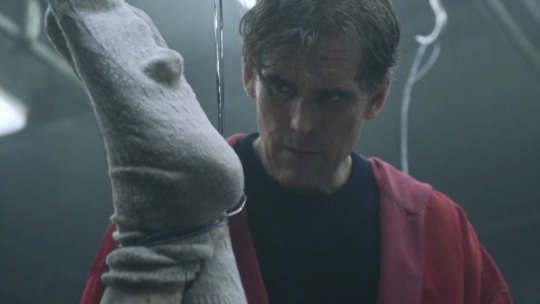
PART 5: DAMNATION
As good as Sloan’s summation of his modus operandi on Welcome to the Basement was, I have my own go-to log line: von Trier’s story is the story of a man who got everything he wished for, but was still miserable. For the first part of his career, von Trier was determined to an almost psychotic degree to be seen as one of the great auteurs of cinema. Anyone who didn’t agree was the fucking enemy. When his 1991 film Europa, which was up for the Palme d’Or at Cannes, won the Jury Prize instead, von Trier lashed out, calling that year’s jury president, Roman Polanski, “the midget” during his acceptance speech, and later hurled his trophy into the French Riviera in anger. But then his luck began to change. His next film to play in competition, 1996’s Breaking the Waves, won the Grand Prix and was nominated for an Oscar, and 2000’s Dancer in the Dark finally won him his long sought after Palme d’Or. After years of angrily bashing the world cinema establishment over the head with his own inflated opinion of himself, von Trier was finally one of the most respected and discussed filmmakers of the day.
The thing is, once you’re on top, there’s only one way you can go. He never finished his proposed “Land of Opportunities” trilogy, completing only the first two installments, Dogville and Manderlay, both of which were met with mixed to negative reviews. Von Trier soon found himself spiraling into depression and alcoholism, twin demons that he has wrestled with cinematically over the course of the last decade. It would not surprise me if The House That Jack Built was von Trier’s final film. On one hand, it feels like the thesis statement, the grand summary, of what he’s been trying to say with all of his films. On the other hand, in recent interviews, the guy just looks terrible. He’s frail, he’s got the tremors, his hair is unwashed and ratty and his clothes look ill-fitting and dirty. Despite getting sober not long after the Melancholia press conference debacle, it’s clear that alcohol abuse has taken quite a toll on him. Perhaps its gauche and inappropriate to speculate from afar on von Trier’s mortality, but he’s already done it himself, by making The House That Jack Built.
EPILOGUE: FUTILITY
Now that I’ve reached the end of this jeremiad of a review, I have to wonder, what was it all for? You’ve probably already made up your mind about whether or not you’re going to see this film. You’ve probably already got a very strong opinion on Lars von Trier, both the man and his work. Some of you are probably judging me for even having paid money to see this film, which is your right. Odds are, whatever you think about this filmmaker and his films are not going to be swayed either way by anything I have to say. And even if you did want to experience The House That Jack Built like I did, you can’t: last night was the only night that von Trier’s “Unrated Director’s Cut,” the one that screened at Cannes, is going to be shown in theaters (a stunt that has apparently landed IFC Films in hot water with the MPAA), before an R-rated version is released next month. Was this a shameless promotional ploy? Yes. Did it still give us weirdo cinephiles the feeling that we were part of a super naughty super secret club? Absolutely. I didn’t know anyone in that dark and chilly corner of Greenpoint, but I feel connected to them for life, since we all went through this cinematic journey to Hell together. So, then, now that we’ve descended into the flames, how to describe The House That Jack Built? It is vibrant and stuffy and brilliant and maddening and hilarious and terrifying and pretentious and vulnerable and prescient and infuriating and awful and a masterpiece. In other words, it is a Lars von Trier film. You know what you’re getting yourself into.
youtube
#ANALOG SCUM#the house that jack built#lars von trier#ifc films#scum in the aisles#matt dillon#uma thurman#bruno ganz#siobhan fallon hogan#riley keough#horror#slasher#serial killer#gore#art house#world cinema#foreign film#cannes film festival#exploitation#cult#cult film#cult movie#brooklyn horror film festival#film noir cinema#directors cut
2 notes
·
View notes
Text
Us & Them
A concept that's been on my mind for some time has been what I like to refer to as the "us & them" concept that is found throughout the pages of Scripture. Maybe this was prodded in part from the various interactions with Universalists whom the Lord seems to have placed in my life because he has a sense of humor.
Or something.
Or maybe it was prompted by the hills-old debate of cur alli prae allis and the occasional skirmishes over election/conversion that take place from time to time on the roiling seas of Twitter. Either way, I believe it is a clear concept if one is to allow the Scriptures to speak as they are. And it prompts some much-needed soul searching as well. Because while we can examine the "us & them" teachings of the Bible, the "us" still need to ask some pretty pointed questions about how we are to feel about the "them." Merely establishing the categories and not praying for and reaching out with the Gospel to the "them" would not only be cold and unloving it would be unscriptural.
Teeth Breaking And Other Classic Davidic Lyrics
For those of you who know tidbits about me, first of all: I'm truly sorry. But if you do know me you know that I have tarried in the extreme metal scene since I was just past the toddler age (it seems). And if you're at all familiar with any of that music—again, I'm sorry—you would know that lyrics can often be dark, violent, death-centered and other generally happy terms of description.
And I'm here to say that some of the "sickest" lyrics in all of music are in the psalms.
One cannot read through the psalms without sensing the "us & them" mentality. And when it comes to dealing with the "them," King David wrote lyrics that even King Diamond would have to tip his top hat to. Now I'm not going to do an exhaustive concordance from the psalter showing every time an instance of "us & them" occurs because that's what boring people like seminary professors or students do. But just take Psalm 58, for example. A classic example of "us & them" as well as a bit of divine irony, in my opinion. If you subscribe to the notion that the headings of the psalms are as much a part of Scripture as the psalms themselves, you are A) right and B) about to understand what I mean.
The heading of Psalm 58 indicates that the psalm was supposed to be accompanied by the tune from "Do Not Destroy." But then the lyrics kick in and the reader thinks maybe the copyists made a mistake and it was supposed to read "Seek And Destroy." The Holy Spirit, through the pen of David, goes on to not only describe the "us & them" but has some pretty visceral requests of what God should do to the "them." Including my favorite line: "Break the teeth in their mouths, O God; tear out, O LORD, the fangs of the lions!" (Psa. 58:6).
Now I know what Jesus said. Love your enemies. Pray for those who persecute you. Turn the other cheek. And trust me, there will be more on these concepts later provided the ADHD doesn't kick in and I sudd
...
But the fact of the matter is that the inspired David saw an "us & them" in the world in which he lived. Not everyone was on his team. Not everyone honored God. And, quite frankly, calling for the destruction of the "them" does not immediately imply that God's people—even in antiquity—don't love them. This is a concept I deal with all the time having a parish in the shadow of Fort Bragg. There are Christian soldiers. Plain and simple fact. And they are often called upon to assault and zero out their foes. They also know that, according to their Savior, they are called to love them as well. If this concept was untenable to me, the Lord would not have me here. (REMINDER: Jesus never told the soldiers to stop being soldiers. He told them to be content with their pay.)
Now most of the "us & them" instances in the psalms are usually in the form of the "wicked and the righteous." This article is not intended to flesh out those concepts in great detail. There are other more learned and boring men who have done so. Suffice it to say that wicked=unbeliever and righteous=believer. It is this spiritual concept that I am most concerned with. Basically, in our day and age, those in the Body of Christ and those not. (I can hear the Universalists loading already.) This is an "us & them" concept that has not been foreign to God's people except in recent centuries. There is an us. There is a them. Plain and simple.
Ask Paul.
Imma Talk About The Them And Then The Us, Romans
In the very first chapter of Pablo's letter to the Romans, he greets the church (as he always does) and then immediately launches into a section on the "them" (See 1:21-32). But then he goes on to call out some of his readers as those who "do the same thing," almost as if he was saying you guys aren't the "us." And here we have one of the key concepts and understandings of what it means to be a non posse non peccare Christian. When we compare ourselves with the "them" of the world, we dare not say that somehow or another we are less sinful, less depraved. We simply admit it. And if we read on into chapter 3, Paul even lumps himself into the "them" language when he asks "What shall we conclude then? Are we any better? Not at all!" (3:9).
But as Paul progresses in the letter it becomes quite evident that he wants to address the "us" of the church. And while he makes some pretty blatant and harsh comparisons early on, in no way does he suggest that the "them" and the "us" are the same. Instead, he launches into a discussion on being justified by faith. And the sola fide concept of the Reformation is a clear statement of what separates the "us & them." Faith in the Savior and unbelief. Again, plain and simple.
How To Feel About The "Them"
I could launch into a veritable Bible study on "God wants all men to be saved" and he "so loved the world" and takes "no pleasure in the death of the wicked." I could also add Jesus' statements from above about loving our enemies and turning the other cheek. But what I want to focus on is not the "what" but the "how." We know how we should feel about the "them." We should love them. We should ache for them the way Paul even wished he could be cut off from Christ so that every Jew could be an "us."
But if you are saddled with a short fuse, like this one guy I know, the "how" of this is so much more difficult.
It is so much easier to give the proverbial 'one-finger salute' when you see what the "them" have to say about God, the Bible, his creation, his flock, and his institutions of life and family. It is harder to take a moment and pray for them. Sometimes it's in our best interest to do this and NOT engage the "them." Our patience simply won't allow it. And when that happens, it behooves us to pray for them AND us. That they might be enlightened with the Gospel and that we might be blessed with more patience.
My sanctification is best described as "two baby steps forward, five Goliath steps back." I find it best to begin the day asking to be presented with one opportunity where I might pray for and genuinely love a "them." Be they an adherent to a false religion, a nonbeliever, or even an enemy. I also pray for more opportunities to share the Savior with "thems." (And I want to be crystal clear: I am not a gifted evangelist. This is something I need to work on.) My overall point is that it is not enough to simply acknowledge the "what we know" of the Bible about the "us & them."
We know there's an "us & them." We know we're supposed to love even the most difficult of "thems." We know this is often hard to do and needs to be consciously "worked at."
But we never do so without the understanding that, by God's grace and unending mercy, we are the "us." And we were made the "us" at the great price of the suffering, blood, and death of Immanuel. The "one and only Son." The song lyric "Your death is my salvation to a kingdom mine" was written by a "them." But for the "us" that is a true statement in regards to Christ. Because of him alone we will enjoy an eternal bliss with all the "us" of all time.
Including David.
Including Paul.
May this be our constant motivation to see the "them" in a way our Savior God would have us see them. Loved. Deeply.
0 notes
Text
46 Books, 1 Year
In 2016 I didn’t QUITE make it to my goal of reading 50 books, but I sh*t out an adorable human instead so I don’t feel too bad. Because of the pregnancy and baby-having, I also decided to cut myself some slack and didn’t take notes after finishing each book (which I usually do), so this year’s reviews are not as detailed as usual. But if you’re interested in learning more about any of these reads, just message me and I can chat more about them!
1. The Year of Living Danishly: Uncovering the Secrets of the World’s Happiest Country / Helen Russell
I am obsessed with the Danish concept of hygge (which loosely translates to ‘coziness’). I wanted to learn more about how to live a life full of hygge and other ways of increasing happiness. This is a fitting read for this time of year. January doesn’t have to be cold and depressing; it can be full of candlelight, soft blankets, comforting food, and friends and family. The message seems to be to nestle in and hibernate together!
2. Dragonfly in Amber / Diana Gabaldon
The second book in the Outlander series follows Claire and Jamie as the battle of Culloden approaches. Can they stop it? Or does attempting to change history result in even worse outcomes?
3. Voyager / Diana Gabaldon
I can’t say much about the third book in the Outlander series, as it will spoil some big plot twists. So I’ll just say that the sex scenes are as great as ever!
4. Six Metres of Pavement / Farzana Doctor
Set in Toronto, this story follows three broken people as they slowly find community and acceptance with each other - Ismail grieves his infant daughter years after her death (which was ultimately his fault), Celia, recently widowed, deals with loneliness and feeling unwanted, and Fatima, a queer university student, deals with the fallout of coming out to her traditional family. A heartwarming read, though the plot feels a bit too contrived.
5. The Light Between Oceans / M.L. Stedman
You best read this one before the movie comes out! Or is it already out and I’m that out of touch now? This story will make you want to visit all the barren, lonely lighthouses you can find. It will also make you thank god for your relatively uncomplicated life. This book is heartbreaking and features baby-stealing (with the best of intentions), WWI PTSD, and a look at life (for better or worse) in small town Australia.
6. Cinder / Marissa Meyer
You thought for a second I’d forgone my first love, YA Dystopian? Nuh uh! This is the first in a series that works fairytale characters into a futuristic world full of spaceships, robots, and a violent lunar people. “Cinder” obviously pays homage to Cinderella. But instead of one glass slipper, she’s got one bionic leg and is an expert mechanic.
7. Circling the Sun / Paula McLain
Based on the real-life love triangle between Beryl Markham, Karen Blixen and Denys Finch Hatton in while colonial Kenya, McLain takes us from Beryl’s “wild” childhood without a mother figure playing with her Kipsigis (a Kenyan tribe) best friend and riding horses, to her bold and sometimes disastrous adult years training horses, falling in and out of love and lust, and eventually becoming one of the first women to fly solo across the Atlantic. This is a well-written and dreamy story, but ignores most of the world outside the expat community. Is that irresponsible? I don’t know.
8. Wolf Winter / Cecilia Ekback
If there’s a better “dead of winter” read, I don’t know what it is. I loved this tale taking place in 1717 in Swedish Lapland. A disparate group of settlers struggles to survive a particularly brutal winter just after one of their members turns up dead. Was it actually an animal attack? Many of the settlers believe otherwise as suspicion and cabin fever set in.
9. Behind the Beautiful Forevers / Katherine Boo
This non-fiction account of a Mumbai slum reads like a novel. Journalist Katherine Boo spent months getting to know the slum’s residents, gaining insight into their hopes and dreams, the drudgery of their day-to-day existence, and the political and personal ties between them all. Their stories will break your heart.
10. Expecting Better: Why the Conventional Pregnancy Wisdom Is Wrong - and What You Really Need to Know / Emily Oster
I’ve always dreaded pregnancy, mainly because of all the policing of pregnant women’s bodies. This book is a nice antidote to all of that. When Oster, a statistician, became pregnant for the first time, she gathered together all of the valid studies about caffeine and alcohol consumption, gardening, certain foods, owning cats, etc, etc, etc and and complied their results, determining what’s really harmful to a growing baby and what’s not. Have your cup of coffee in the morning, ladies. And a glass of wine now and then is just fine! But no ciggies. No ciggies at all.
11. The Heart Goes Last / Margaret Atwood
Atwood’s latest novel does not disappoint. Set in a near-dystopian future, a new gated community takes the prison-as-business model one step further. Rotating every month, half of the population acts as prisoners in an actual prison, while the other half maintain the town or work as prison guards. It’s efficient, right? Less housing required, the prisoners all do work to help the town, everyone gets a salary. But it just might be too good to be true…
12. Drums of Autumn / Diana Gabaldon
Once again, I can’t say much about the fourth book in the Outlander series for fear of spoilers except that Jamie and Claire are a bit older now, and there’s a new generation of sexy Scottish people to populate your daydreams.
13. Fifteen Dogs / Andre Alexis
I don’t know what to say about this book other than I both loved it and hated it? This is also the book my book club has spent the most time ever talking about. Set in Toronto, it follows 15 dogs staying the night at a veterinary clinic who are suddenly blessed/cursed with human consciousness. What follows is occasionally comedic, but mostly violent and terribly sad.
14. I Just Want to Pee Alone / Some Kick Ass Mom Bloggers
I should probably have waited to read this collection of true stories until after I’d had the baby. In one story, a woman describes her post-birth vagina as a sad old elephant.
15. The Damned / Andrew Pyper
Pyper is great at sketching out a truly creepy character. In this story, Dan is haunted by his deceased twin sister, who happened to be a sociopath while alive. Now that she’s dead, her ability to torture him seems to have no bounds. I also really liked the book’s setting of Detroit.
16. Scarlet / Marissa Meyer
The second book in the “Lunar Chronicles” series, this book focuses on a Red Riding Hood-inspired protagonist. And the love interest is pretty wolf-like. Oooh mama!
17. The Sense of Style: The Thinking Person’s Guide to Writing in the 21st Century / Steven Pinker
Full disclosure: This is a grammar book. Basically you shouldn’t read this unless you write for a living / want to really improve your writing. I’m not even sure I should have read it. Some tips were great, others were too detailed for me to grasp, others I already forget.
18. Walkable City: How Downtown Can Save America, One Step at a Time / Jeff Speck
Though this book focuses on American cities, it applies to anywhere. If you’re an amateur urban planning nerd like me, you’ll love this book. Two fun factoids - trees increase a neighbourhood’s value and liveability A LOT and you’re more likely to suffer a heart attack in the few hours after you’ve been driving a car. Driving in a city is THAT stressful.
19. How to Be a Woman / Caitlin Moran
In this non-fiction tome of memories / essays, well-known British feminist Moran takes on body image, sex, working in the music industry, pregnancy and childbirth, living in poverty, and abortion.
20. The Jade Peony / Wayson Choy
This novel reads more like a series of related short stories, and follows the childhoods and teenage years of three siblings, Jook-Liang, Jung-Sum and Sek-Lung living in Vancouver’s Chinatown in the 1930s and 40s. This is a touching book, and each child deals with their own stresses and troubles from losing a beloved grandmother to realizing one’s sexuality to the difficulties of life as a child of new immigrants.
21. Shrill: Notes from a Loud Woman / Lindy West
Lindy West is my hero, and the author of my favourite piece of comedic writing ever, a hilarious review of Jurassic Park from beginning to end. She’s also a fiercely intelligent feminist and this is her first book. It’s about trying to make herself as small and quiet as possible, only to realize that that’s bullshit. As women, we should be as big and loud as we want.
22. I Was Told There’d Be Cake / Sloane Crosley
This is a non-fiction collection of stories from Crosley’s life. Who is she? I didn’t know before and I still don’t really know, but she’s a Jewish New Yorker who is a good writer and is pretty funny. This collection is not heavy in the least - it’s just some funny and amusing anecdotes from a regular person’s life.
23. Tampa / Alissa Nutting
Hooooooooo boy. What can I say about this one? Nutting tells the story of Celeste Price, a 26-year old middle school teacher who is a pedophile. And Price is relentless in her pursuit of the perfect victims, searching for boys just on the cusp of puberty. This is kind of a reverse “Lolita”. But I gather it’s way grittier (I have not read “Lolita” so I can’t say for sure). Nutting is a good writer and her style is very, shall we say, visceral? But this book is not for everyone.
24. The Widow / Fiona Barton
This book felt like Barton’s attempt to get on the “Gone Girl” / “The Girl on the Train” bandwagon, and it fell short. I don’t recommend it. I also hated the main character, a simpering weakling of a woman.
25. Time Zero / Carolyn Cohagan
This feels like a “The Giver” of our time. It’s also a truly feminist YA dystopian novel. In it, Cohagan has created a world (in what used to be Manhattan) run by men with a set of very harsh rules for women. In a poignant twist, all of the rules in the novel are actual rules that various women around the world today have to live under. I really believe this book should be added to the public school curriculum.
26. Battle Royale / Koushun Tatami
Before “The Hunger Games”, there was “Battle Royale”. Set in a dystopian Japan, each year in a government experiment, random classes of ninth graders are sent to secluded locations and forced to kill each other until one survivor remains. To prevent runaways, each student must also wear a collar which explodes if the student tries to escape. YIKES. A cult classic, this is a sad and violent read full of interesting characters.
27. Before the Fall / Noah Hawley
A private plane crashes into the Atlantic ocean, and of the 11 people on board, only two survive - a young boy and the lone outsider, an aspiring artist who’d recently befriended one of the rich passengers. This is a tight, scintillating thriller, and as the mystery of what (or who) caused the crash unfolds, we get an inside look at each of the passenger’s thoughts and backgrounds. I didn’t love the resolution, but the excellent lead-up was worth the read.
28. The Passage / Justin Cronin
I reread this for the third time in advance of the release of “The City of Mirrors” (book 30), the third in this trilogy. This remains my favourite book / series of all time. It’s a dystopian/sci-fi/thriller/epic full of an amazing cast of characters and spanning over a century.
29. The Twelve / Justin Cronin
I also reread the second book in “The Passage” trilogy.
30. The City of Mirrors / Justin Cronin
As expected, the final book in this trilogy both thrilled me and broke my heart.
31. The Haunting of Maddy Clare / Simone St. James
I just wanted a good old-fashioned book about a ghost set in the British countryside. This book was that, but was cheesier than I thought it would be. And unexpectedly involved a sexy romance sub-plot which was enjoyable and terrible at the same time.
32. The Girls / Emma Cline
In the summer of 1969, bored and naive teenager Evie befriends a mysterious older girl named Suzanne, who slowly brings her into the folds of a Manson-inspired cult. The Manson-y cult leader isn’t quite as big a character as you might think, and the book, like the title, really does focus on the relationships between young girls that we can all relate to - the idolization, the obsessiveness, the jealously, the fervent love we sometimes feel for each other.
33. The Last Star / Rick Yancey
I had to read the final book in “The Fifth Wave” alien trilogy, and much like the “Divergent” series, this series gets worse with each tome.
34. The Bluest Eye / Toni Morrison
Penola is a young Black girl growing up in Ohio in the post-Great Depression era. Her life is shit. Daughter to an abusive father and an overtired and busy working mother, teased at school, and simply put, already beaten down by life, all Pecola wants are for her eyes to turn blue. This is a classic and an important read for these times.
35. Indian Horse / Richard Wagamese
This novel tells the story of Saul, an Ojibway boy sent to a residential school after his family spends a few years trying to protect him from just such a fate. Saul’s only escape from the horrors of the school is his growing love of hockey. It turns out that he’s a gifted player, and his talent allows him a chance at a better life. All Canadians should read this book. The racism Saul experiences in the 1970s is still alive and well today all across this country.
36. Harry Potter and the Cursed Child / J.K. Rowling, John Tiffany, Jack Thorne
If you’re a Potter fan, you’ve also already read this, and if you’re not, you don’t care!
37. After Birth / Elisa Albert
I read this novel in preparation for motherhood. In it, we meet Ari, a first-time mother dealing with feelings of loneliness and the emotional fallout of her caesarian section. She cannot get over it, and her anger and sadness are palpable. She later befriends mother-to-be Mina, and the two develop their own little support system (or should I call it a lifeline?). This is a much needed story about pregnancy, birth, mothering, female friendship, and the importance of support from friends, family, and the medical profession.
38. Sex Object: A Memoir / Jessica Valenti
In this collection of anecdotes from feminist and journalist Valenti, she tackles issues of sexism, harassment, internet trolling and your everyday, run-of-the-mill misogyny against the backdrop of her youth and young adulthood in New York. Add this to your growing feminist library (we all have one, right?)
39. Parenting Beyond Pink and Blue: How to Raise Your Kids Free of Gender Stereotypes / Christia Spears Brown, PhD
The title says it all. But as you’ve probably seen, Fern wears a lot of pink. You can’t say no to hand-me-downs and gifts! I guess I’ll work to combat gender stereotypes in other ways…
40. Middlesex / Jeffrey Eugenides
This is a sprawling coming-of-age story about Cal, who is intersex. When born, Cal appeared to be a girl and was raised as such. As they go through puberty, Cal’s transformation is more confusing and painful than that of most, and they start to question their identity. Eugenides also details the strange and somewhat taboo history of Cal’s family, illustrating that nothing occurs in a vacuum. We exist in the context of our families. This was a thoughtful and engaging read.
41. Everything I Never Told You / Celeste Ng
This novel explores all the things we don’t tell those we are closest to - our spouses, our children, our parents, our siblings - and the fallout of these omissions. It also explores the unique challenges of a mixed-race family living in 1970s America including overt and subtle racism, feelings of not belonging, and questioning one’s own identity. On top of all this, Ng has also rolled in a gripping mystery.
42. The Japanese Lover / Isabel Allende
Allende is one of my favourite authors, but this book fell flat. The dialogue felt forced and preachy, and the characters, especially the Japanese ones, were often stereotypes. A tale of illicit love and Japanese internment camps (sounds promising, right?) I would skip this one, especially if you’ve never read Allende before.
43. North American Lake Monsters / Nathan Ballingrud
I was so excited to read this collection of strange and scary short stories, but it was a disappointment. Ballingrud does not take any of these stories far enough, and the endings were almost all vague and left things up in the air. I don’t consider this tactic all that artistic anymore, it just seems lazy. COMMIT TO AN ENDING, authors, COMMIT TO A DANG ENDING!
44. Cold Mountain / Charles Frazier
Towards the end of the Civil War, soldier Inman has had enough. Recovering from a serious neck wound in hospital, he decides to defect and make his way home to Cold Mountain and his love, Ada. Meanwhile, back on Cold Mountain, Ada’s fallen on hard times and is in serious survival mode. As Inman makes his long way home, Frazier paints a broken and bloody countryside on the cusp of something new.
45. Mrs. Poe / Lynn Cullen
This is a juicy historical fiction novel about the love triangle between Edgar Allan Poe, his wife, and his contemporary, writer Frances Osgood. Surprisingly, the delicate ingenue Mrs. Poe seems like the creepiest one of the three (whether or not this is based on fact, I don’t know). I loved the setting, the plot, and the literati cast of characters, but the style of writing was a bit fluffy. It felt as though Cullen was writing with a future movie deal in mind.
46. All My Puny Sorrows / Miriam Toews
Set in Winnipeg and Toronto, this story follows a Mennonite family plagued by tragedy after tragedy. Toews explores issues of intergenerational trauma, suicide, mental health, the damaging effects of patriarchy, and how amidst all that, love still flourishes.
0 notes